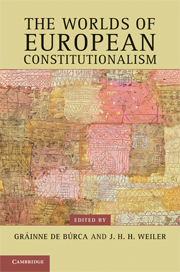Book contents
- Frontmatter
- Contents
- Contributors
- Introduction
- Prologue: global and pluralist constitutionalism – some doubts
- 1 The European Union as an international legal experiment
- 2 The place of European law
- 3 The ECJ and the international legal order
- 4 Local, global and plural constitutionalism
- 5 The case for pluralism in postnational law
- Dialogical epilogue
- Bibliography
- Index
2 - The place of European law
Published online by Cambridge University Press: 05 June 2012
- Frontmatter
- Contents
- Contributors
- Introduction
- Prologue: global and pluralist constitutionalism – some doubts
- 1 The European Union as an international legal experiment
- 2 The place of European law
- 3 The ECJ and the international legal order
- 4 Local, global and plural constitutionalism
- 5 The case for pluralism in postnational law
- Dialogical epilogue
- Bibliography
- Index
Summary
The EU and political modernity
Studies of the EU across different disciplines tend to divide between those that start from an assumption of continuity and those that start from an assumption of discontinuity. The point of departure for analysing the EU’s legal, political, social or economic character is either a familiar and historical-grounded set of accomplishments, aspirations, practices and concepts; or it is a tabula rasa, with no guarantee how or indeed whether any part of our existing heritage of achievements and ideas will be drawn into the new picture. The present study is emphatically located in the former category. It assumes, and seeks to substantiate the assumption that rather than signalling a break with the paradigm of political modernity centred upon the modern state and its legal and constitutional edifice, the EU reflects and contributes to a variation in the form of political modernity. More specifically, it claims that the deep issues that define, shape and challenge late political modernity in the era of the emergence of polities beyond the state such as the EU remain substantially the same deep issues as defined, shaped and challenged high political modernity in the age of the ‘state system’. The central aim in what follows is to demonstrate how three such defining – and overlapping – issues, and the oppositions and tensions that they generated in politics and in law in the phase of high modernity, continue to frame our understanding of late modernity, so providing important insights into the conflicted role of the EU polity within the constellation of late modernity. In particular, they tell us something significant about the nature and extent of the EU’s historical reliance upon law as a medium of integration, about the dangers and limitations of such reliance, and also, finally, about whether and to what extent such dangers and limitations might be overcome within law itself.
The first and most basic issue that shapes our understanding of political modernity is the development of the very idea of collective agency as the animating source and subject of political community. Indeed, the articulation and operationalization of an expansive notion of collective agency, it is argued, supplies the indispensable threshold condition of political modernity. The canonical modern form assumed by this core idea of collective agency has been ‘the people’ – or popular sovereign – conceived of as a discrete state-centred and state-centring ‘unity of a manifold’. But the arrival of the idea of the people as sovereign leaves open and often contested a range of questions concerning both its internal limits and its external accompaniment. Internally, what kinds of difference and what divisions are consistent with the conception of the people as a single collective agency? Externally, what other political forms, and what, if any, other kinds of political community may emerge and subsist alongside the state conceived of under the sign of popular sovereignty?
- Type
- Chapter
- Information
- The Worlds of European Constitutionalism , pp. 57 - 104Publisher: Cambridge University PressPrint publication year: 2011
- 6
- Cited by

